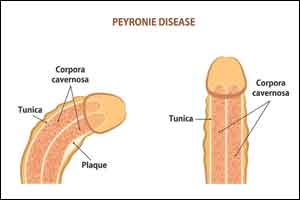- Home
- Editorial
- News
- Practice Guidelines
- Anesthesiology Guidelines
- Cancer Guidelines
- Cardiac Sciences Guidelines
- Critical Care Guidelines
- Dentistry Guidelines
- Dermatology Guidelines
- Diabetes and Endo Guidelines
- Diagnostics Guidelines
- ENT Guidelines
- Featured Practice Guidelines
- Gastroenterology Guidelines
- Geriatrics Guidelines
- Medicine Guidelines
- Nephrology Guidelines
- Neurosciences Guidelines
- Obs and Gynae Guidelines
- Ophthalmology Guidelines
- Orthopaedics Guidelines
- Paediatrics Guidelines
- Psychiatry Guidelines
- Pulmonology Guidelines
- Radiology Guidelines
- Surgery Guidelines
- Urology Guidelines
Men with curved penis have increased cancer risk

Peyronie's disease is a disorder of the connective tissue of penis wherein it develops a significant curve.It is also referred to as penile fibrosis and fibrous plaques grow in the soft tissue. The scar tissue shortens and curves the penis and causes painful erections and erectile dysfunction.The incidence of Peyronie's disease is estimated from 1–23 percent of men between the age of 40–70 years. The disease affects around 155,000 male adults in the UK, and while it is more common in men over 40, it can happen at any age.
There is no identified cause of Peyronie's disease and it may be linked to an injury to the penis or a series of injuries over time or there may also be an autoimmune component to Peyronie's.The disease has a genetic predisposition and runs in families and it has been found lately that some of the genes that have a relationship with Peyronie's disease appear to be involved in certain types of human cancer.It has been found that WNT2, a protein-coding gene associated with Peyronie's causes colorectal cancer progression and also the progression of other cancers.
It was found that there was an increased risk of stomach cancer (HR 1.43, 95% CI 1.02-2.00), melanoma (HR 1.19, 95% CI 1.02-1.38), testis cancer (HR 1.39, 95% CI 1.05-1.84), and all cancer (HR 1.10, 95% CI 1.06-1.14) among men with PD when compared with men with ED. On analysis, it was found that men with Peyronie's had a 43 percent greater risk of stomach cancer, a 19 percent increased risk of melanoma, and a 39 percent increased risk of cancer of the testis.The study has been published in the journal of Fertility and Sterility.

Disclaimer: This site is primarily intended for healthcare professionals. Any content/information on this website does not replace the advice of medical and/or health professionals and should not be construed as medical/diagnostic advice/endorsement or prescription. Use of this site is subject to our terms of use, privacy policy, advertisement policy. © 2020 Minerva Medical Treatment Pvt Ltd